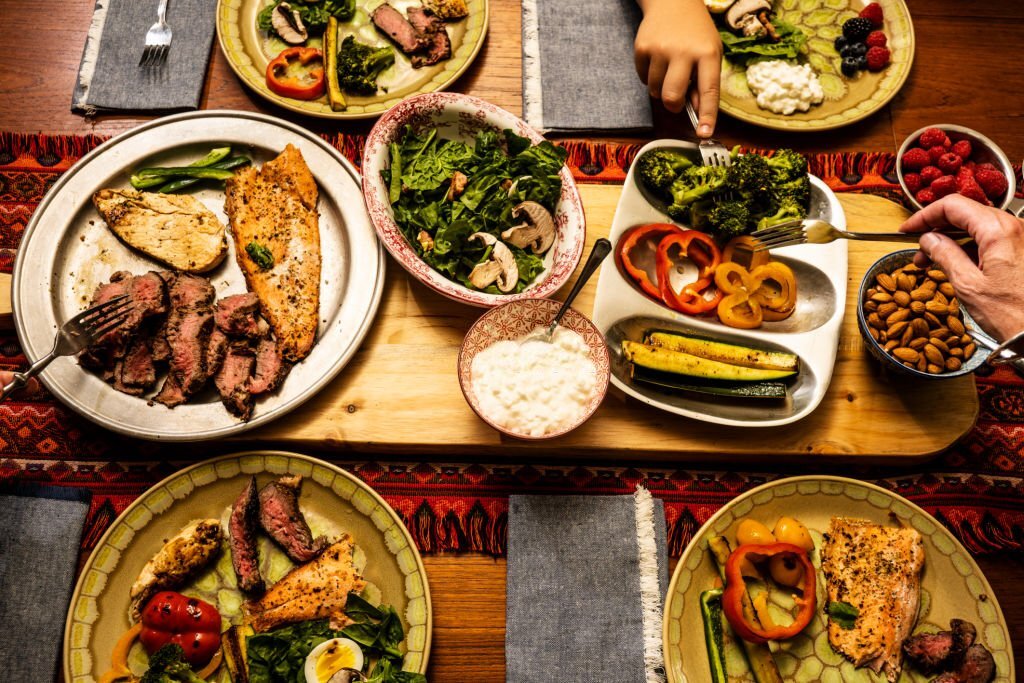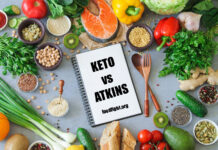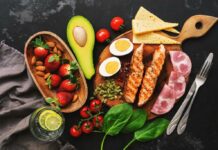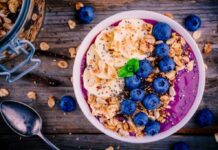Are you looking to switch up your diet and take it to the next level? Going keto can be a revolutionary way to transform your health in one fell swoop.
It's like hitting the reset button on your body, giving you a chance to start anew with more energy and clarity than ever before!
This article will provide an overview of the best foods for a keto diet so that you can make sure you're getting all the nutrients necessary for success.
We'll discuss healthy fats, low-carb vegetables, proteins sources, nuts and seeds, dairy products, fatty fish, and sweetening options.
All these foods are essential for keeping your body fueled while sticking to this incredibly effective diet. Let's get started!
Key Takeaways
- Healthy fats, such as avocados, olive oil, coconut oil, and nuts & seeds, should make up 70%+ of daily caloric intake on a keto diet.
- Adequate protein is important for building muscle mass and repairing cells, with lean protein sources like fish or chicken breast preferred.
- Nuts and seeds provide necessary nutrients, with chia seeds being an excellent source of fiber.
- Fatty fish like salmon and mackerel are low in carbs and rich in omega-3s and essential vitamins and minerals, making them a great addition to a keto diet.
Understanding the Basics of the Keto Diet
Wondering what the keto diet is all about? Let's dive into the basics to get you started!
The ketogenic diet is a low-carbohydrate, high-fat plan that helps your body switch from burning glucose (sugar) for energy to burning fat. To reach this state of ‘ketosis,' most people on a keto diet limit their carb intake to under 50 grams per day.
Since carbs are broken down into glucose, this means you'll be avoiding sugary foods like bread and pasta in favor of good keto foods such as meat, fish, eggs, nuts, seeds, and healthy fats like avocado and olive oil.
Foods allowed on the keto diet also include some dairy products like cheese and cream as well as certain vegetables with low carbohydrate counts such as spinach and kale.
A full keto food list can give you an idea of what types of food fit into the diet best. But that's not all there is to know about the keto diet; it's also important to incorporate healthy fats into your meals!
Healthy fats make up 70% or more of your daily caloric intake when following a strict ketogenic plan, which is why it's critical that they come from sources like avocados, olive oil, coconut oil, nuts & seeds instead of processed junk food or fast food options.
This ensures that your body gets enough essential fatty acids needed for optimal health while still keeping you in nutritional ketosis.
Additionally, adding MCT oil or powder can help boost energy levels while helping curb hunger cravings throughout the day.
With these guidelines in mind, meal planning for a successful transition onto the Ketogenic Diet becomes much easier!
It's important to remember though that everyone's dietary needs will vary, so feel free to experiment with different recipes until you find one that works best for you and fits within your macros goals.
From there, transitioning onto the Keto Diet can be both rewarding and enjoyable if done correctly – giving you more freedom when it comes to reaching your desired health & fitness goals!
Incorporating Healthy Fats into Your Meals
Adding healthy fats to your meals is essential for optimal health on any diet, especially the keto diet.
Eating a variety of healthy fat sources can provide many benefits, such as improved satiety and energy levels.
The best foods for a ketogenic diet include:
- Avocado: Rich in monounsaturated fats that help promote heart health and reduce inflammation.
- Olive oil: A great source of omega-3 fatty acids, which are known to have beneficial effects on cognitive function, brain health, and overall well-being.
- Nuts and seeds: Loaded with plant-based proteins and beneficial nutrients like magnesium and zinc.
All of these foods can be incorporated into a balanced keto menu for optimal nutrition.
For example, avocados can be enjoyed as part of an egg scramble or used as a topping on salads or burgers. Olive oil is perfect for drizzling over roasted vegetables or marinating fish or chicken dishes.
And nuts and seeds make excellent snacks when eaten in moderation alongside other low-carb vegetables like celery and bell peppers.
Including healthy fats into your meals provides essential nutrients that are key to sustaining energy while following the keto diet.
In addition to providing fuel for your body, incorporating these foods into your daily routine may also help reduce cravings for unhealthy food choices that could potentially sabotage weight loss efforts.
Taking the time to plan out what you eat during the day will ensure you're eating balanced meals that include all the necessary macronutrients needed for success on this lifestyle change – including plenty of healthy fats!
Low-Carb Vegetables for Optimal Nutrition
Incorporating low-carb vegetables into your meals is an essential part of optimizing your nutrition on any healthy lifestyle change.
Vegetables are a great source of vitamins and minerals, as well as fiber, which helps to promote satiety and keep you feeling fuller for longer.
When it comes to the keto diet, some veggies can be higher in carbs than others, such as potatoes or sweet potatoes.
However, there are plenty of other vegetables that can fit perfectly into a healthy keto meal plan.
Leafy greens like kale, spinach, Swiss chard, and collard greens are all excellent choices because they're low in carbs but high in fiber.
Other delicious options include cauliflower, broccoli, Brussels sprouts, and zucchini.
Incorporating these nutrient-dense veggies into your meals will not only help you stay within the recommended daily carb range for this diet but also get vital nutrients that your body needs to stay healthy.
Making sure to consume enough protein while following the keto diet is also important for optimal health outcomes.
Protein is essential for building muscle mass and repairing cells throughout our bodies, so it's crucial to make sure we get enough from our diets.
Eating adequate amounts of protein can also help keep us full for longer periods of time, which can be beneficial when trying to lose weight or maintain a healthy one.
It's important to choose lean sources of protein such as fish or chicken breast instead of processed meats like bacon or sausage when possible since these types of foods have more saturated fat than necessary for this type of diet plan.
Additionally, adding eggs into your meal plans during this time can provide many vitamins and minerals that may be lacking due to cutting out certain food groups while on the keto diet such as whole grains and legumes.
The next step towards creating a balanced meal plan with the keto diet is making sure you have some quality sources of fats included in each meal too!
Healthy fats from avocados, nuts & seeds, or olive oil will provide energy needed during this lifestyle change while helping you achieve your goals too!
Protein Sources for a Balanced Diet
Getting enough protein in your diet can be a key component to maintaining balance and health while following a healthy lifestyle change.
Protein is essential for muscle growth, development, and maintenance, as well as for healthy organs and bones.
It's important to include complete proteins that contain all nine of the essential amino acids in your diet. Here are some protein sources that you can add to your keto diet:
| Food | Protein (g) | Calories (kcal) |
|---|---|---|
| Chicken Breast | 31 | 165 |
| Salmon | 22 | 196 |
| Eggs | 6 | 78 |
| Greek Yogurt | 17 | 127 |
| Tuna | 25 | 179 |
Eating a variety of lean animal proteins such as chicken breast or salmon can provide complete proteins with beneficial amino acids along with vitamins and minerals.
Eggs are an easy source of high-quality protein that may boost weight loss due to the satiating effect it has on its own.
Greek yogurt provides probiotics which may help digestion, immunity, and overall health.
Tuna could also be included in your keto meals for its low carb content but high protein levels.
It's important to remember that even if you are eating nutrient-dense foods, you should still keep portion control in mind when following the keto diet plan.
Too much of any food group won't benefit your health; instead it will likely lead to fat storage or other unwanted effects.
With this knowledge, you can now move onto exploring the many options of nuts and seeds for snacking on during the day!
Nuts and Seeds for Snacking
Snacking on nuts and seeds can be a great way to add delicious and nutritious options to your diet. Did you know that an ounce of almonds contains 6 g of protein, 14 g of healthy fats, and only 164 calories?
Walnuts are also a great source of healthy fats as well as omega-3 fatty acids. An ounce of walnuts provides 4 g of protein, 18 g of fat, and 185 calories.
Eating just one handful a day is enough to meet the daily recommended intake for these essential nutrients.
Seeds such as pumpkin and sunflower provide magnesium which helps your body better absorb calcium from other sources like dairy products.
Eating just two tablespoons per day is enough to get all the minerals our bodies need without exceeding calorie intake limits set by the keto diet.
Nuts and seeds are also an excellent source of fiber which plays an important role in keeping your digestive system running smoothly while on the keto diet.
Just one ounce of chia seeds has 10 grams of dietary fiber – more than half the daily recommended amount!
Fiber helps keep you feeling full longer between meals so that you don't feel tempted to snack on unhealthy foods or overeat at mealtime.
In addition, it helps reduce cholesterol levels which can lead to better heart health overall while on this particular diet plan.
Not only do nuts and seeds provide necessary nutrients for a balanced keto diet but they're also incredibly tasty too!
You can easily incorporate them into smoothies, trail mixes, salads or even oatmeal for added crunchiness and flavor in every bite!
With their numerous health benefits and versatile flavor profiles, there's no reason not to include these snacks in your regular rotation when following this low-carb lifestyle.
For those looking for an extra boost in calcium or fat content dairy products are another great option.
Dairy Products for Calcium and Fat
Adding dairy to your diet can provide a great source of calcium and fat while on the keto lifestyle. Dairy products are generally high in saturated fats, which are beneficial when following a low-carbohydrate diet.
In addition, dairy contains essential minerals such as calcium, phosphorus, and magnesium that help maintain healthy bones and teeth.
Low-fat butter, cheese, yogurt, cream, and milk can all be incorporated into the daily meal plan for an extra boost of energy.
Full-fat Greek yogurt is becoming increasingly popular among people trying to lose weight or adopt a healthier lifestyle. Not only is it rich in protein but also contains probiotics that can help improve gut health and digestion.
Furthermore, studies have shown that consuming full-fat dairy may lead to increased satiety and better blood sugar control compared to its low-fat counterparts.
Eating fatty fish like salmon or mackerel is another way to get omega-3 fatty acids into your diet while still following the keto principles.
These types of fish are packed with protein and contain fewer carbohydrates than other sources of animal proteins such as beef or chicken.
Additionally, they are rich in vitamins A & D which can help support the immune system and promote overall health.
Moving onto fatty fish for omega-3s and protein will be discussed further in the next section.
Fatty Fish for Omega-3s and Protein
Swap out your regular steak dinner for some salmon and reap the rewards of omega-3s and protein without sacrificing taste!
Wild-caught fatty fish like salmon, mackerel, sardines, and anchovies are a great addition to any keto diet.
Not only are they naturally low in carbs but they provide essential vitamins and minerals like B12 and selenium along with omega-3 fatty acids which can help reduce inflammation.
Additionally, these types of fish offer an excellent source of lean protein that can keep you feeling full longer.
Some studies have even shown that eating more seafood can improve triglyceride levels which is important for heart health.
Here's the best part: all these benefits come with no compromise on flavor!
Fatty fish are so versatile; they can be cooked up in dozens of delicious ways.
Grill it on a cedar plank or skewer it with veggies over an open flame. Bake it in parchment paper or poach it in white wine sauce — the possibilities are endless!
With a little imagination, you'll find yourself looking forward to adding this healthy meal option into your weekly rotation.
Sweetening Your Meals with Low-Carb Options
Now that you've got your fatty fish covered, it's time to think about sweetening your meals on the keto diet.
While traditional sweets such as candy and cake are off limits due to their high sugar content, there are still some delicious options for those of us looking for a low-carb sweet treat. You may be surprised by how many options are available!
One great choice for a keto-friendly dessert is dark chocolate. Dark chocolate contains less sugar than milk chocolate and provides beneficial antioxidants like polyphenols that can reduce inflammation and improve heart health.
Plus, it's naturally lower in carbs than other forms of chocolate, making it an excellent option if you're trying to stay within the carb count guidelines of the keto diet.
Another great low-carb choice is berries; strawberries, blueberries, and raspberries all contain fewer carbs than other fruits but still provide plenty of flavor and nutrition.
For those times when you need something truly decadent without breaking the rules of a low-carb lifestyle, try using alternative sweeteners like stevia or monk fruit extract which have virtually no calories or carbs at all! Many recipes have been created with these natural sweeteners in mind so that you can enjoy sweets without any guilt.
So go ahead – satisfy your sweet tooth while keeping your carb intake in check!
Frequently Asked Questions
What is the recommended daily calorie intake for a keto diet?
The recommended daily calorie intake for a keto diet is dependent on the individual's nutritional needs.
Generally, it's best to start with an amount of calories that is slightly lower than your usual intake and adjust as needed.
The average person usually requires around 2,000-2,500 calories per day to maintain their weight. However, when following a keto diet, this number can drop significantly to 1,500-1,800 calories per day.
This reduction in caloric intake allows your body to enter into a state of ketosis which helps you burn fat more effectively and efficiently while still providing enough energy for daily activities.
How can I make sure I'm getting enough vitamins and minerals on a keto diet?
You don't have to worry about getting enough vitamins and minerals on a keto diet! By following a few simple steps, you can make sure your body is getting all the nutrients it needs.
Picture this: when you switch from a higher-carb diet to a low-carb one, you'll be eating more fat and protein than before. This means that you'll be taking in fewer carbs but also more vitamins and minerals, as these are naturally found in healthy fats and proteins.
To ensure that your nutrient intake remains balanced, add leafy greens like kale and spinach to your meals and focus on eating lean proteins like salmon or grass-fed beef.
Additionally, consider supplementing with multivitamins or individual supplements if needed. This will help bridge any nutritional gaps in your nutrition plan.
What are some quick and easy meals for a busy lifestyle on a keto diet?
If you're looking for quick and easy meals that also adhere to a keto diet, there are many options!
For breakfast, try an egg scramble with vegetables like spinach and mushrooms.
For lunch or dinner, prepare a big batch of zucchini noodles with pesto sauce. If you want something more filling, grilled chicken breast over cauliflower ‘rice'is a great option.
And don't forget about snacks! Low-carbohydrate options such as nuts, hard boiled eggs, and cheese sticks make for delicious on-the-go treats.
With these simple recipes in your arsenal, it's easier than ever to enjoy tasty meals while still following your keto diet.
How can I ensure I'm getting enough fiber on a keto diet?
You may feel restricted by the keto diet, but you don't have to worry about getting enough fiber!
An easy way to make sure you're meeting your daily needs is to incorporate high-fiber vegetables like Brussels sprouts and broccoli.
As a bonus, these veggies also provide essential vitamins and minerals that'll help keep your body running like a well-oiled machine.
Not only are they incredibly nutritious, but they come together quickly in tasty dishes that won't keep you slaving away in the kitchen all night.
So take a break from counting macros and enjoy some guilt-free veggies for dinner tonight – your body (and taste buds) will thank you!
Are there any special considerations for people with diabetes on the keto diet?
Yes, people with diabetes should take special considerations when following a keto diet.
It's important to monitor your blood glucose levels more frequently than usual and start with small, gradual changes in your carbohydrate intake.
Additionally, it may be helpful to work closely with a healthcare professional to ensure you're taking the necessary precautions.
Finally, make sure to include plenty of healthy fats and proteins in your meals for balanced nutrition.
Conclusion
You don't have to be limited to boring, restrictive meals on a keto diet. There are plenty of delicious and nutritious options available!
By incorporating healthy fats, low-carb vegetables, protein sources, nuts and seeds, dairy products, fatty fish, and low-carb sweeteners into your meals, you can create a balanced eating plan that's both satisfying and enjoyable.
As the saying goes: ‘you are what you eat,' so make sure to choose quality ingredients for optimal health benefits.
With some creativity and careful planning, you'll find the perfect combination of foods for your keto diet.






